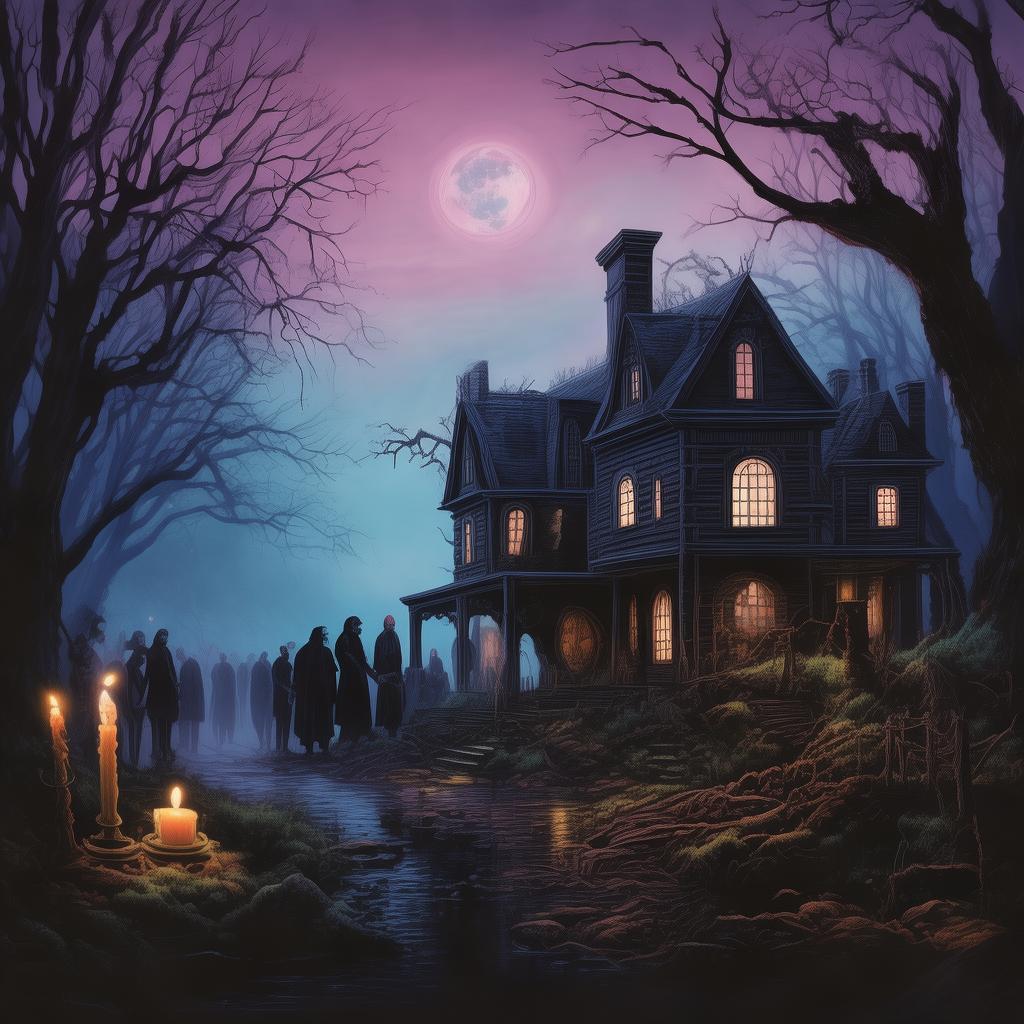The Haunting of the Whispering Willow
The sun dipped below the horizon, casting a golden hue over the quaint town of Willow's End. The streets were quiet, save for the occasional rustle of leaves in the wind. Inside a dilapidated house at the end of Willow's End Road, a young girl named Eliza stood at the threshold, her eyes wide with a mix of excitement and trepidation. She had just moved in with her grandmother, who had purchased the house for a song from a man who claimed it was haunted but offered no further explanation.
The house, once a beautiful Victorian, now stood as a shadow of its former self. The paint was peeling, and the windows were fogged with the remnants of years of neglect. Eliza had heard whispers of the house's past from her grandmother, tales of a girl who had vanished without a trace, leaving behind nothing but a haunting laugh and the eerie feeling that she was never truly gone.
As Eliza stepped inside, the air grew colder, and a chill ran down her spine. She could hear the faintest whispering, as if someone were calling her name. It was unsettling, but she pushed the thought aside. She was determined to make the house her home, no matter the ghosts that lingered within.
The next morning, Eliza woke to the sound of laughter. It was a high-pitched, eerie sound that sent shivers down her spine. She got out of bed and wandered through the house, searching for the source. She found it in the attic, where the laughter seemed to echo from the rafters. She followed the sound, her heart pounding in her chest, and found an old, dusty mirror leaning against the wall.
As she approached the mirror, the laughter grew louder, and she saw the reflection of a girl, her eyes wide with terror, her mouth twisted in a grotesque smile. The girl vanished as quickly as she appeared, leaving Eliza standing there, her breath catching in her throat.
From that day on, the laughter followed Eliza wherever she went. It was always there, a constant reminder of the girl's presence. She began to see her in her dreams, the girl with the haunted eyes, her laughter echoing in the darkness.
Eliza's grandmother noticed the change in her behavior and decided to investigate the house's past. She discovered that the girl, named Abigail, had been a popular girl in town until the night she vanished. She had been seen arguing with a mysterious man outside the house, and then she was gone. The police had never found her body, and the mystery had been shrouded in silence for decades.
Eliza's grandmother explained that Abigail had been a victim of a serial killer who preyed on young girls. The man had lured her to the house, promising her a ride home, but instead, he had taken her life. The laughter was Abigail's way of trying to warn others, a haunting reminder of the danger that had lurked in the shadows.
As the days passed, Eliza felt a strange connection to Abigail. She began to see her in the house, not just in her dreams, but in the corners of her waking life. She could feel her presence, and she knew that Abigail was trying to communicate with her.
One night, as Eliza lay in bed, she heard the laughter again. This time, it was louder, more desperate. She got out of bed and went to the attic, where she found Abigail, her eyes filled with fear and desperation.
"Please help me," Abigail whispered, her voice trembling.
Eliza knelt beside her and took her hand. "What do you need me to do?"
Abigail's eyes met hers, and she spoke in a voice that seemed to come from everywhere and nowhere. "I need you to tell the truth. I need you to tell the world what happened to me."
Eliza nodded, understanding that she had to face the truth, no matter how difficult it might be. She returned to the living room and began to write a letter to the police, detailing what she had learned about Abigail's death.

The next morning, Eliza gave the letter to her grandmother, who promised to deliver it to the police. As she walked outside, she heard the laughter again, but this time, it was softer, almost like a sigh of relief.
Eliza returned to the house, and as she looked around, she saw Abigail standing in the corner, her eyes filled with gratitude. The laughter had stopped, and the house felt different, lighter.
Eliza knew that Abigail had finally found peace, and she felt a sense of closure. She had faced the truth, and in doing so, she had helped Abigail rest in peace.
The house was still haunted, but the laughter had stopped, and the presence of Abigail was no longer felt as menacing. Eliza had become the bridge between the living and the dead, and in doing so, she had freed both herself and Abigail from the haunting that had bound them for so long.
✨ Original Statement ✨
All articles published on this website (including but not limited to text, images, videos, and other content) are original or authorized for reposting and are protected by relevant laws. Without the explicit written permission of this website, no individual or organization may copy, modify, repost, or use the content for commercial purposes.
If you need to quote or cooperate, please contact this site for authorization. We reserve the right to pursue legal responsibility for any unauthorized use.
Hereby declared.









